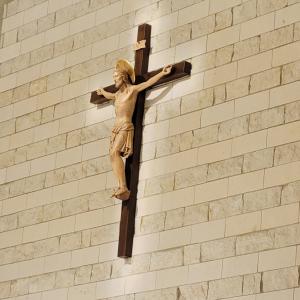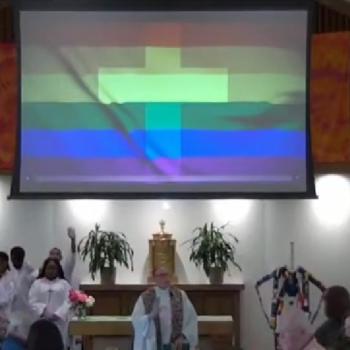Sorry for the delay in posting articles. Life got a bit busy at the end of the school year. Those with school-aged kids know this all too well.
On the Feast of Corpus Christi, Catholics around the world celebrated the mystery of the body and blood of Christ present in the Eucharist. Western (Roman) Catholics call this mystery transubstantiation. Basically, Catholics believe Christ is hidden, yet substantially present in the Eucharist: body, blood, soul, and divinity. Since the beginning, this belief scandalized many who sought to follow Jesus, as witnessed in John 6:66, where many followers walked away from Christ due to this teaching. The Catechism states in paragraph 1336:
The first announcement of the Eucharist divided the disciples, just as the announcement of the Passion scandalized them: “This is a hard saying; who can listen to it?” The Eucharist and the Cross are stumbling blocks. It is the same mystery and it never ceases to be an occasion of division. “Will you also go away?”: the Lord’s question echoes through the ages, as a loving invitation to discover that only he has “the words of eternal life” and that to receive in faith the gift of his Eucharist is to receive the Lord himself.
Moreover, these truths of our faith led me to think of those who fail to see God, not only as hidden in the Eucharist, but in creation itself. In philosophy, this idea often gets labeled as divine hiddenness.
In this article, I do not offer a comprehensive response to divine hiddenness, only a reflection on how God can seem to “hide” in plain sight. I leave it to highly trained philosophers and apologists for a more thorough explanation.
Divine Hiddenness
J.L. Schellenberg presents the most common form of the problem (taken from the link above).
(1) There are people who are capable of relating personally to God but who, through no fault of their own, fail to believe.
(2) If there is a personal God who is unsurpassably great, then there are no such people.
(3) So, there is no such God (from 1 and 2).
For those interested, please click here for an excellent dialogue between Dr. Gavin Ortland and Justin Schieber on divine hiddenness. In that dialogue, Mr. Schieber explains that a truly loving God would ensure that “all who are capable” (everyone) believe in God. Since not everyone believes, a truly loving God does not exist (or any God exists at all). In other words, a great God ensures unbelief does not exist.
Who Really Hides?
After the Fall, we read in Genesis 3:9-10 that Adam and Eve hid themselves from God.
But the Lord God called to the man and said to him, “Where are you?” And he said, “I heard the sound of you in the garden, and I was afraid, because I was naked, and I hid myself.”
Here, due to their disobedience, Adam and Eve experienced fear for the first time. They also experienced exposure before God, having removed themselves from God’s favor (grace). Notice, too, that God looked for them. God sought them out.
Like Adam and Eve, do we hide from God?
The Naked and Deadly Presence of God
Later in Genesis, God reveals Himself to Moses. During the crafting of the Ten Commandments, Moses asks to see God’s glory, or, face-to-face. To this God replies:
But,” he said, “you cannot see my face, for man shall not see me and live.” And the Lord said, “Behold, there is a place by me where you shall stand on the rock, and while my glory passes by I will put you in a cleft of the rock, and I will cover you with my hand until I have passed by. Then I will take away my hand, and you shall see my back, but my face shall not be seen.” Exodus 33:20-23
Interestingly, here, God hides Moses in a cleft of a rock and covers him. God does this to protect Moses from the unfiltered glory or presence of God, as such an experience would prove deadly for Moses. However, such an experience of even the filtered presence of God physically alters the appearance of Moses.
When Moses came down from Mount Sinai, with the two tablets of the testimony in his hand as he came down from the mountain, Moses did not know that the skin of his face shone because he had been talking with God. Aaron and all the people of Israel saw Moses, and behold, the skin of his face shone, and they were afraid to come near him. But Moses called to them, and Aaron and all the leaders of the congregation returned to him, and Moses talked with them. Exodus 34:29-31
Moreover, does the above reflect an experience of an “unsurpassably great” God per Schellenberg’s argument? If so, to what profit does such an experience lead when it proves ultimately lethal?
Till We Have Faces
C.S. Lewis’ last novel addressed the topic of divine hiddenness. Presented as a retelling of pagan myth, Lewis retells the story of Apuleius’s Cupid and Psyche. In this tale, we read about the relationship between Psyche and her half-sister Orual. The story, told from the perspective of Orual, concerns her indictment against the gods. She contends that the gods remain hidden and uninterested in human affairs. Ironically, Orual chooses to wear a veil to hide her ugliness. She also hides her true self away in her pursuit of power, selfishness, and wickedness. At the end of her life, Orual learns why the gods remain silent.
I saw well why the gods do not speak to us openly, nor let us answer. Till that word can be dug out of us, why should they hear the babble that we think we mean? How can they meet us face to face till we have faces?
And
I know now, Lord, why you utter no answer. You are yourself the answer. Before your face questions die away. What other answer would suffice?
Here again we read of hiding and hidden things. Orual seeks the gods on her terms, not theirs. She expects them to answer her “babbling” when she does not even know what she means herself. Once she realizes the truth, once she assumes a face in which to meet the gods “face to face,” the gods had nothing to converse with. Furthermore, the answer is ultimately the gods themselves. The answer is presence, not mere words.
The Hidden God of the Incarnation
In conclusion, let’s circle back to the Feast of Corpus Christ. Catholics believe Christ is hidden within the substance of the Eucharist. This idea of hiddenness comes from belief in the incarnation of the Logos in a human body. As Vatican document The Reciprocity Between Faith and Sacraments in the Sacramental Economy states:
For in Jesus Christ, as the summit of history and the fullness of time (Gal 4:4), there is the closest possible unity between a creatural symbol, its humanity, and what is symbolized, the saving presence of God in his Son in the midst of history. Christ’s humanity, as humanity inseparable from the divine person of the Son of God, is a “real symbol” of the divine person. In this supreme case, the created communicates to the highest degree the presence of God.
In Christ, God conceals His lethal glory to touch us, to embrace us, to save us. He leaves behind the Sacraments, especially the Eucharist, to continue this embrace. He continues to hide in plain sight. We, in turn, must cease our own hiding and show our true face.
Thank you!
Read The Latin Right’s other writing here.
Please visit my Facebook page and IM your questions (and follow my page) or topics for articles you would like covered.
Also, please subscribe my YouTube page for updates on upcoming articles.













